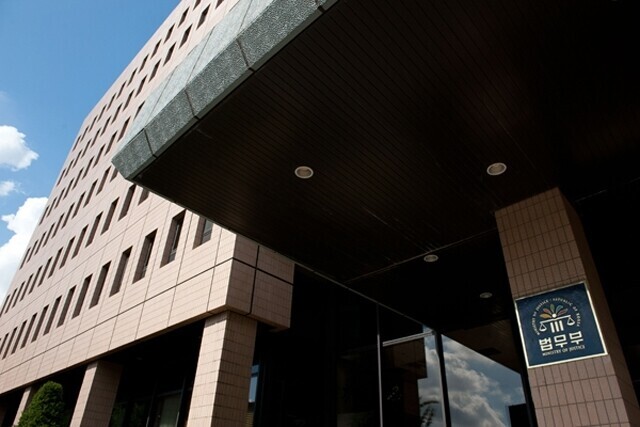hankyoreh
Links to other country sites 다른 나라 사이트 링크
LGBT refugees consistently face abusive questions during application process

Tiara (pseudonym), a transgender woman, left the country where she’d lived for 40 years and came to South Korea. In her homeland, she’d always been at risk of being beaten or suffering sexual violence merely for being transsexual. She was even threatened by a member of her own family, who said, “If you don’t remove your breast implants, I’ll remove them myself.”
So Tiara fled from her home and chose the path of a refugee. While a friend recommended that she seek asylum in South Korea, she was disappointed from the very beginning of the process.
The refugee screening office at the Ministry of Justice (MOJ) who interviewed Tiara for her refugee application lacked even the basic knowledge about LGBT people and demanded to know why Tiara was transgender.
The question that followed was even more shocking: “Have you ever had sexual relations with a man?” While it was a degrading question, she mustered up the courage to answer, determined to prove the persecution she’s suffered. “When I was around 11 years old, I was sexually assaulted by a leader at a boy scout camp.”
That answer elicited an unexpected response: both the examiner and the interpreter burst into laughter. The examiner even told her that “that scout leader gave you your first lesson about sex.”
“The examiners treated me rudely. They didn’t seem very understanding of LGBT people,” Tiara recalled.
Tiara is not alone in her experience. Many have commented on human rights violations in interviews by examiners showing a lack of understanding and awareness of LGBT refugees. According to an explanation provided by the Minority Refugee Human Rights Network on June 18 ahead of World Refugee Day on June 20, attorneys and activists with experience assisting LGBT refugee applicants agreed that most of them face explicit questions about their sex lives during interviews. The questions -- examples of which included “Have you ever considered being normal?” or “How have you ever had sexual intercourse with multiple people at one time?” -- have been a source of secondary psychological damages.
“It is a violation of the right to human dignity and privacy protection to ask sexually explicit questions based on the prejudicial view that ‘LGBT people are promiscuous,’” said Jeon Su-yoon of the Minority Refugee Human Rights Network.
“We need to institutionalize education [for reviews] to promote understanding of LGBT identity,” Jeon urged.
By Chai Yoon-tae, staff reporter
Please direct comments or questions to [english@hani.co.kr]

Editorial・opinion
![[Editorial] Penalties for airing allegations against Korea’s first lady endanger free press [Editorial] Penalties for airing allegations against Korea’s first lady endanger free press](https://flexible.img.hani.co.kr/flexible/normal/500/300/imgdb/original/2024/0502/1817146398095106.jpg) [Editorial] Penalties for airing allegations against Korea’s first lady endanger free press
[Editorial] Penalties for airing allegations against Korea’s first lady endanger free press![[Editorial] Yoon must halt procurement of SM-3 interceptor missiles [Editorial] Yoon must halt procurement of SM-3 interceptor missiles](https://flexible.img.hani.co.kr/flexible/normal/500/300/imgdb/child/2024/0501/17145495551605_1717145495195344.jpg) [Editorial] Yoon must halt procurement of SM-3 interceptor missiles
[Editorial] Yoon must halt procurement of SM-3 interceptor missiles- [Guest essay] Maybe Korea’s rapid population decline is an opportunity, not a crisis
- [Column] Can Yoon steer diplomacy with Russia, China back on track?
- [Column] Season 2 of special prosecutor probe may be coming to Korea soon
- [Column] Park Geun-hye déjà vu in Yoon Suk-yeol
- [Editorial] New weight of N. Korea’s nuclear threats makes dialogue all the more urgent
- [Guest essay] The real reason Korea’s new right wants to dub Rhee a founding father
- [Column] ‘Choson’: Is it time we start referring to N. Korea in its own terms?
- [Editorial] Japan’s rewriting of history with Korea has gone too far
Most viewed articles
- 160% of young Koreans see no need to have kids after marriage
- 2Presidential office warns of veto in response to opposition passing special counsel probe act
- 3[Editorial] Penalties for airing allegations against Korea’s first lady endanger free press
- 4Months and months of overdue wages are pushing migrant workers in Korea into debt
- 5Japan says it’s not pressuring Naver to sell Line, but Korean insiders say otherwise
- 630th anniversary Wednesday Demonstration pushed out of memorial site by far-right
- 7Inside the law for a special counsel probe over a Korean Marine’s death
- 8Dermatology, plastic surgery drove record medical tourism to Korea in 2023
- 9[Guest essay] Maybe Korea’s rapid population decline is an opportunity, not a crisis
- 10Trump asks why US would defend Korea, hints at hiking Seoul’s defense cost burden